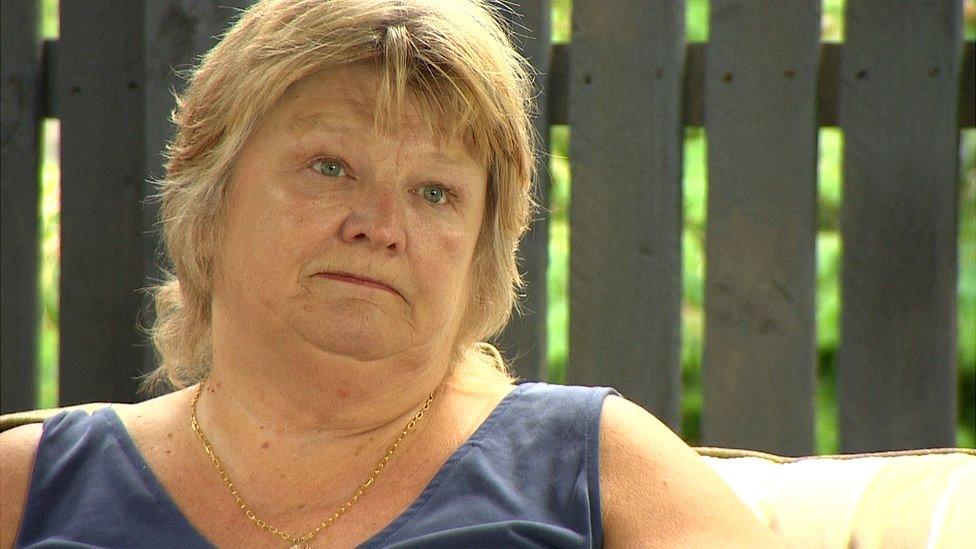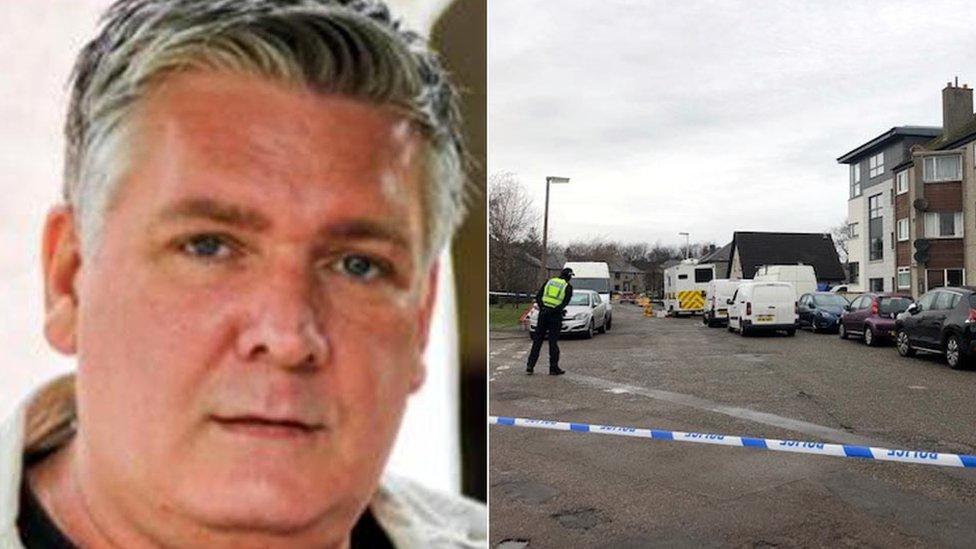'Good Samaritan' murder may have been prevented
- Published

Alan Geddes offered to pay for Stuart Quinn to stay at a hotel, but it was full
The risk to a "Good Samaritan" killed by a stranger he had let into his home could have been reduced.
The Mental Welfare Commission concluded that the death of Alan Geddes in 2019 may have been prevented had Stuart Quinn been offered accommodation when he left prison.
Quinn stabbed Mr Geddes 40 times just a day after being released from custody.
An MSP supporting the victim's family said Mr Geddes, from Aberdeen, died for stepping in "when others had failed".
He had met Quinn on an evening out and offered to pay for him to stay at a hotel, but it was full. Instead, he let Quinn stay in his flat in the city's Ruthrieston Crescent.
Mr Geddes was later found lying at the bottom of stairs with multiple injuries. Police arrived to find Quinn clutching a knife and admitting what he had done.
Quinn, who pleaded guilty to murder, was jailed for a minimum of 18 years in February 2021.
An anonymised report by the Mental Welfare Commission for Scotland investigated the circumstances leading up to the killing.
It found that Quinn, who was referred to in the report as Mr TU, had four relatively brief admissions to psychiatric hospital between March and June 2018, when he was 32, and was diagnosed with drug-induced psychosis.
On each admission, he presented with paranoid delusional beliefs and was detained under the Mental Health Act.
Quinn spent most of 2019 in prison and that December he was released from remand by a court with no support package in place and no accommodation.

The report said there was no certainty that further violence from Quinn could have been prevented
In 2021 the High Court in Glasgow heard Quinn was "upset and crying" on his release in 2019 and was due to receive help for personal issues.
The report said offering accommodation to Quinn might have reduced the risk to Mr Geddes.
But it added: "Whilst the risk could have been mitigated at that time, further violence could not have been prevented with any certainty."
It said: "The investigation concluded that following Mr TU's unexpected release from prison in December 2019, although a support package and accommodation may have reduced the likelihood of further offending, evidence from a planned liberation in September 2019 indicated that even with a comprehensive support package in place and with accommodation provided, Mr TU rapidly re-offended, was rearrested and returned to prison.
"However, if Mr TU had been offered accommodation in December 2019 this is likely to have reduced the risk to the specific victim who invited him to his home because of his lack of accommodation."
The report said many aspects of the care Mr TU received in 2018 from the health board involved were of "high quality".
Sandra Geddes says her bother Alan was generous and loved by everyone
However, it said there were aspects of that care, including how risks were assessed and managed and the involvement of Mr TU's nearest relative, which "if acted on, might have mitigated the risk of violence when he was discharged from inpatient care in June 2018".
The report made six recommendations for change for the involved health board and health and social care partnership, including issues such as risk management, hospital discharge planning and consent to share information.
There were six further recommendations for the Scottish government, including on support for those released from prison, the national mental health workforce strategy and hospital discharge standards.
'Cataclysmic failings'
Alison Thomson, of the Mental Welfare Commission, said: "The range of our recommendations reflects the complexity of the case. We recognise the challenges involved for all of those who provided care and treatment for Mr TU.
"Nevertheless, the investigation found there was learning for clinical services that could improve the care and treatment of those with substance-induced psychosis and mitigate the risk of future violence."
Scottish Conservative north-east MSP Douglas Lumsden, who has supported the Geddes family throughout the case, said: "This damning report highlights the cataclysmic failings of Scotland's justice system and how easy it was for a violent, high-risk offender to be released early with no consideration of the dangers he posed to the public.
"The lack of rigorous assessments in this case has exposed significant gaps in mental health, prison aftercare and supervision.
"Alan was a Good Samaritan who died merely because he stepped in when others had failed."
A report by the Scottish Fatalities Investigation Unit (SFIU) published in 2021 found "no psychotic symptoms were identified" and the Scottish Prison Service was "statutorily obliged" to release him.
The Crown Office then took the decision not to hold a Fatal Accident Inquiry.
Following the publication of the Mental Welfare Commission report, a Scottish Prison Service spokesman said they worked with a range of agencies to "enable the continuity of service provision for those leaving our care".
He said: "Whilst we do not comment on individual cases, we endeavour to ensure that individuals liberated from custody have appropriate support networks in place to aid their transition back into the community."
A spokesperson for the Scottish government said it would "carefully consider this report before responding formally", adding: "Our thoughts continue to be with the family of the victim of this tragic event."
Aberdeen City Health and Social Care Partnership's spokesman also said they would consider the report and "act upon any of the recommendations".
Related topics
- Published9 March 2023

- Published12 August 2021

- Published8 March 2021

- Published24 February 2021

- Published17 February 2021
